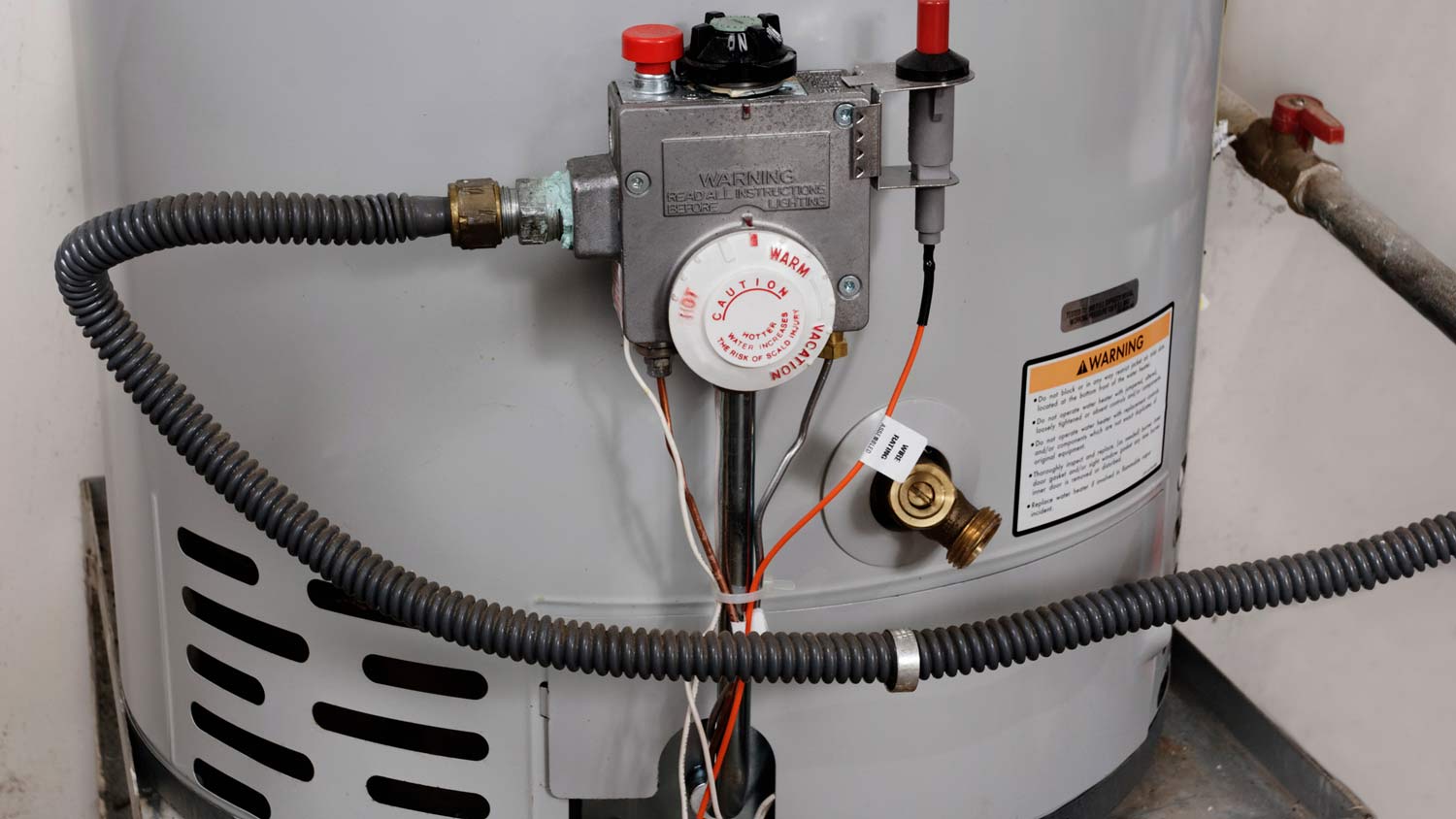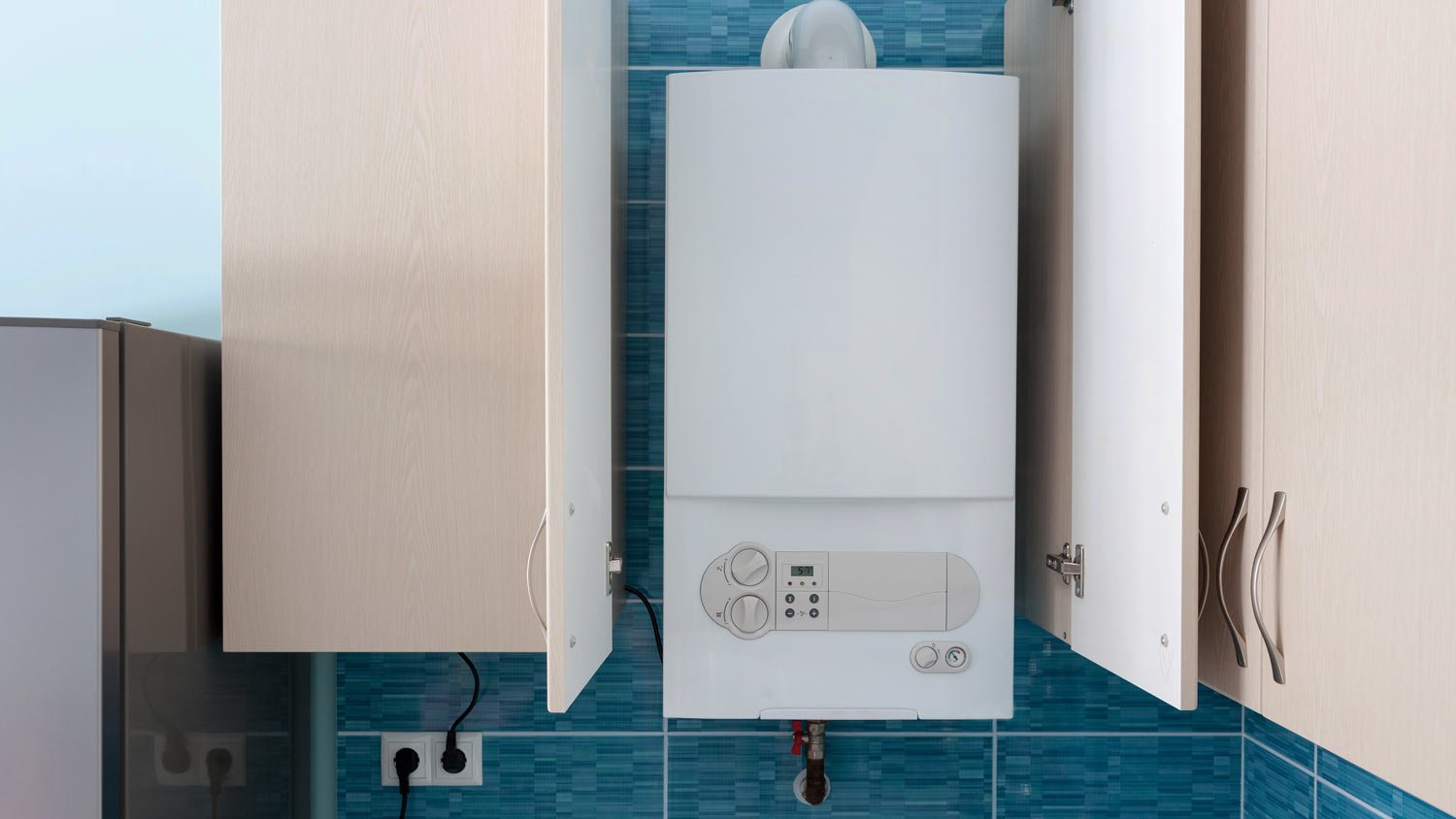Tankless Water Heaters vs. Storage Tank: Key Differences
Don't get into hot water when choosing the right type of water heater


Storage tank and tankless water heater systems have a balance of pros and cons.
The best system for your home depends on size, water usage, and your current setup.
Tankless water heater systems save money on utilities but require more maintenance.
Tankless water heater systems can last up to twice as long as tank water heaters.
From steamy morning showers to a hot laundry cycle, the water heater is the unsung hero of our homes. Like many homeowners, you may have gotten wind of the growing tankless water heater trend—also called demand water heaters. But is the switch worth the price, extra space, and efficiency? We put tankless water heaters and tank-style units head to head to heat up the competition.
Storage Tank Water Heater: Pros and Cons

What is a Storage Tank Water Heater?
Storage tank water heaters were once the standard type of water heater for heating your water. Tanks are typically 2 feet wide, between 5 and 6 feet high, and are located in the basement, a closet, or wherever your home allows. The water tanks hold an average of 50 gallons of pre-heated water at a time, keeping it ready for when you turn on the sink and scrub the dishes. They run on a variety of power sources, including electric, propane, and natural gas. You'll even find solar water heater designs.
Pros
Stores heated water for instant use
Runs on a wide range of fuel sources
Generally costs less to install and repair
Larger tanks can accommodate homes with high water demands
Cons
Requires a large amount of space for the tank and related plumbing
Shorter life span than tankless water heaters
Relatively expensive and cumbersome to replace
Uses more energy to heat water throughout the day
Tankless Water Heater: Pros and Cons

What is a Tankless Water Heater?
Growing more popular each year, tankless water heaters cut out the cumbersome tank and warm water as it passes through a heat exchanger. Since the system doesn't have to constantly heat gallons of water on reserve, you'll generally use less power to keep it running. That being said, tankless water heaters still come with pros and cons.
Pros
Lower energy usage and utility bills
Requires far less space
Lower long-term replacement costs
Offers an endless supply of hot water in most cases
Cons
Water may take longer to heat up, especially in colder regions
Higher installation costs when switching from a storage tank design
Higher repair costs
May struggle to supply water for large homes
Storage Tank Water Heater vs. Tankless Water Heater
The tankless vs. tank water heater debate is not a clear-cut battle. While some categories—such as space requirements and water heater longevity—have definite winners, most are harder to decipher. A water heater installer near you can offer advice on which option is better for your unique home and water needs.
Space Requirements
Here's an easy one. A storage water heater tank holds between 50 and 80 gallons. The tank often requires 5 or more feet of height and at least 2 feet of space, in addition to the wiggle room for fittings and building code requirements.
On the other side of things, a tankless system takes up about as much space as a meter box, coming in around 2 feet high and 1 foot wide. Keep in mind that the heater must be mounted to a wall and have access to the outdoors to vent properly.
Still, a tankless system takes up less space and is best for homes with limited square footage.
Best for space: Tankless water heater
Installation Price
The cost comparison between tankless and tank water heaters is more complex. Let's start with basic water heater installation costs:
Storage tank installation costs between $600 and $2,500 on average
Tankless systems cost between $1,200 and $3,500 to install
These installation costs will also rise if you're transitioning from a tank to a tankless heater.
You'll pay $2,500 for labor alone for the cost of a tankless water heater system and more if you need to retrofit the gas or electrical lines to accommodate the new system.
In other words, tankless water heaters will cost a bit more to install and—as we'll go into more below—less to operate.
Best price: Storage tank water heater
Performance
Whether you choose a tankless or storage tank water heater, it's important to choose the right size for your home's hot water needs. Otherwise, you could end up with an ice-cold blast of water when someone runs the dishwater.
A professional can help you determine the size of your tankless water heater, depending on its flow rate or gallons per minute (GPM). You'll need a system with a flow rate of 2 to 12 GPM depending on the:
Number and type of appliances in your home
Temperature of your water source
Number of people in your home
Storage tank water heaters also come in various sizes, with 20-gallon tanks serving smaller homes and 100-gallon tanks for large ones with multiple appliances.
In this debate, tankless and tank water heaters can both perform well when installed correctly.
Best performance: Tie
Ease of Installation
Installing either type of water heater yourself is almost always the wrong decision. Even tankless systems, which appear small and straightforward, often require utility upgrades.
Due to its size, a storage tank is more cumbersome to install and replace. However, a tankless water heater must meet complex building codes and sit close enough to electrical or gas lines.
Ease of installation: Tie
Maintenance and Repairs

Tankless water heaters may be smaller, but they can be fussier due to their setup. Manufacturers often recommend flushing sediment from a tankless water heater line, cleaning the air filter, and clearing the water filter regularly.
While you'll also need to perform traditional water heater maintenance, it only requires flushing the tank and scheduling an annual inspection. So be sure you know how to drain the water heater for a long-lasting unit. While tank heaters still break down, the system is simpler than a tankless design, often leading to fewer and less costly repairs. Water heater repair costs range from $200 to $1,000 on average.
Easy maintenance and repairs: Storage tank water heater
Longevity
Getting curious about all the hype around tankless water heaters? When properly maintained, tankless water heaters can last 20 years or more. Storage tank water heaters, however, average between 10 and 12 years. Since a tank faces corrosion from storing the water day in and day out, it simply can't last as long as a system that only sends water passing through.
Longevity: Tankless water heater
Energy Efficiency
According to the U.S. Department of Energy, tankless water heaters are always more energy efficient than tank heaters due to their longevity and method of heating water. However, the exact percentage of efficiency compared to a tank system depends on how much water your family uses each day.
Homes that use relatively low amounts of hot water—less than 41 gallons a day—can be more than 30% more efficient than traditional systems. Homes that use up to 86 gallons a day, however, only beat traditional heaters by an average of 11%.
And while they may look more expensive on paper, this is just one of the common myths about tankless water heaters when you look at the full picture. You can save an average of $110 a year for gas-powered tankless systems and $45 a year for electric ones.
Efficiency: Tankless water heater
Payback Time
Tankless water heaters pay for themselves over time by offsetting the electricity that you would spend on a tank water heater. But how much you'll save depends on the type of tankless water heater you choose for your home. Gas and electric water heaters come with different cost savings over time.
Since a gas-powered tankless water heater costs between $1,000 and $1,500 and will save you approximately $110 per year compared to a traditional tank water heater, your payback time for a gas-powered tankless water heater is between 9 and 14 years. An electric tankless water heater costs between $800 and $1,500 and saves you around $45 a year, so your payback time for an electric heater is between 18 and 34 years.
Payback time: Tankless water heater
Bottom Line
Pros
| Storage Tank Water Heater | Tankless Water Heater |
|---|---|
| Less expensive for installation and repairs | Energy efficient |
| Preheats and stores water for immediate use | Less space needed for unit |
| Accommodates high water demands | Endless water supply |
Cons
| Storage Tank Water Heater | Tankless Water Heater |
|---|---|
| Large amount of space needed | Higher installation and repair costs |
| Shorter life span | Longer heat-up times |
| Energy inefficient | Not ideal for supplying large homes |
Frequently Asked Questions
Your tankless water heater can keep getting cold for several reasons. Gas-powered tankless water heaters might not receive enough gas to heat the water. You may need to upgrade your gas meter in this case. A faulty pressure valve can also cause cold water to leak into the hot water and cool it down. Mineral buildup can also affect your tankless water heater's ability to heat water.
Knowing how to install a tankless water heater can save you money, but this is one DIY that you should definitely skip. Installing tankless water heaters is challenging, especially if you are installing a gas power tankless water heater or you’re switching from a tank water heater to a tankless one and need new plumbing. Water heater installations require a great deal of experience and know-how, and you should work with a tankless water heater installer near you to successfully complete this project.





- Key Pros and Cons of a Tankless Water Heater
- Can You Use a Tankless Water Heater in Cold Climates?
- How Does a Tankless Water Heater Work and What Sets It Apart?
- Is a Tankless Water Heater Worth It?
- How To Install a Tankless Water Heater
- The 5 Biggest Myths About Tankless Water Heaters
- How Long Does a Tankless Hot Water Heater Last?
- Comparing Heat Pump vs. Tankless Water Heaters
- What to Do if Your Tankless Water Heater Freezes
- Is a Water Softener for a Tankless Water Heater Necessary?










